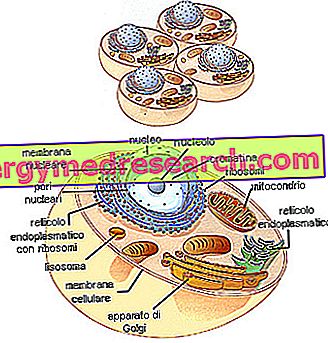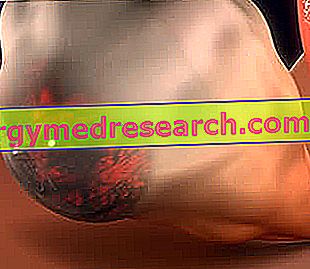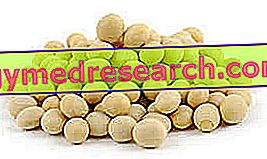Definition
"Meningitis" is an acute and sudden inflammatory process of leptomeninges (arachnoid and pia mater), with a mainly infectious etiology (viral or bacterial); the course of meningitis is variable: in some cases it resolves positively in a few days, in others the disease can even be fatal.
Causes
Meningitis can be caused by the spread of a virus or a bacteria: in the case of viral infection (clear liquor), the disease is much more virulent and dangerous than the bacterial form (turbid liquor). Meningitis can be a consequence of pneumonia or tuberculosis.
Symptoms
The symptoms related to meningitis can be more or less serious, depending on the etiological factor: often, the very first prodromas can be confused by a simple influence. Common symptoms include: anorexia, changes in the menstrual cycle, widespread chills, convulsions, joint and muscle pain, migraine, high fever, photophobia, irritability (especially in children), nausea, cough and vomiting.
Information on Meningitis - Drugs for the Treatment of Meningitis and Prophylaxis is not intended to replace the direct relationship between health professional and patient. Always consult your doctor and / or specialist before taking Meningitis - Meningitis and Prophylaxis Drugs.
drugs
Since meningitis is a rather serious and complicated pathology, it must be treated with powerful drugs such as antibiotics and corticosteroids:
- Benzilpenicillin (eg. Benzil B, Penicillin G): the antibiotic is generally administered if the pathogen has not yet been isolated; for this reason, the patient is treated with a non-specific drug. However, benzylpenicilin is also prescribed in cases of proven meningococcal and pneumococcal meningitis: in the first case, intravenous infusion of 6, 000, 000 IU every 4 hours (or 24, 000, 000 units per day) is recommended for 14 days or until fever decreases. For the treatment of pneumococcal meningitis, we recommend the administration of penicillin G, a 4, 000, 000 IU aqueous solution, every 4 hours for 2 weeks.
- Cefotaxima (eg Cefotaxima, Aximad, Lirgosin) belongs to the class of cephalosporins, broad-spectrum antibiotics particularly effective in the case of meningitis: administer 2 g intravenously every 4-6 hours, depending on the nature and severity of the infection. The duration of therapy should be extended for approximately 14 days. When the pathogen is sensitive to penicillins, replace this active substance with Benzylpenicillin; if the virus or bacteria showed resistance to both penicillins and cephalosporins, it is preferable to associate rifampicin before or simultaneously with the administration of the antibiotic.
- Rifampicin (eg Rifampic) is a bactericidal antibiotic to be taken by mouth (600 mg tablets) or intravenously once a day for 10-14 days. It is indicated for the treatment of pneumococcal, meningococcal and Haemophilus influenzae meningitis .
- Among the antibiotics, chloramphenicol cannot be missing (eg Vitamin phenolic, Mycetin, Chemicetin): IV administration of 50 mg / kg per day is recommended, divided into 4 doses every 6 hours. In severe cases, it is advisable to increase the dosage up to 100 mg / kg per day: however, the dosage must be reduced as soon as possible.
- Corticosteroids (dexamethasone: eg Decadron, Desameta, Etacortilen): reduce inflammation in the meninges. Dexamethasone is recommended in cases of meningococcal meningitis, pneumococcal from Haemophilus influenzae at a dose of 0.15 mg / kg every 6 hours for the first 2-4 days of antibiotic treatment. The cortisone should be injected ev about 10-20 minutes before taking the antibiotic.
- Aciclovir (eg Aciclovir, Xerese) : indicated in case of suspected Herpes Virus infection. The dosage must be established by a doctor.
In the event of complications from meningitis, the doctor may prescribe other targeted drugs to the patient, such as anticonvulsants (to combat convulsions) and hypertensive drugs (when the patient's blood pressure is too low). Some patients suffering from meningitis complain of breathing difficulties of varying degrees: mechanical ventilation or oxygenation is recommended to lighten this disorder.
Drugs for the prophylaxis of meningitis
- For the prophylaxis of meningococcal meningitis (elimination of pathogens from the nasopharynx), it is recommended to administer 600 mg of Rifampicin orally twice a day for two days.
- The conjugated vaccine for meningococcal group C ensures long-term protection exclusively against Neisseria meningitidis of serotype C.
A targeted immunization is recommended for those under 25 years of age: in fact, beyond this age, the risk of contracting meningococcal meningitis decreases.
However, the conjugate vaccine for meningococcus type C is recommended at the end of the child's third and fourth month of life, with a reference to one year of age (especially in combination with the anti- Haemophilus influenzae type B vaccine ). Among the vaccines for the prophylaxis of meningitis remember Menjugate (active ingredient: meningococcal group C vaccine conjugated with Corynebacterium diphteriae CRM 197)
What changes since 2017
With the decree law on the prevention of vaccination for minors from zero to 16 years, approved on 07/28/2017 the vaccine against meningitis ( Haemophilus Influenzae type b vaccine) has become mandatory for those born since 2001 .
As far as vaccinations against meningococcus C and meningococcus B are concerned, although they are not mandatory, they are offered by the Regions and Autonomous Provinces, based on the indications of the vaccination calendar for the year of birth:
- those born between 2012 and 2016 are offered free antimeningococcal vaccinations C
- those born in 2017 are offered free antimeningococcal B, anti-meningococcal C and pneumococcal vaccinations
For more information on mandatory vaccines in children, see this article.



